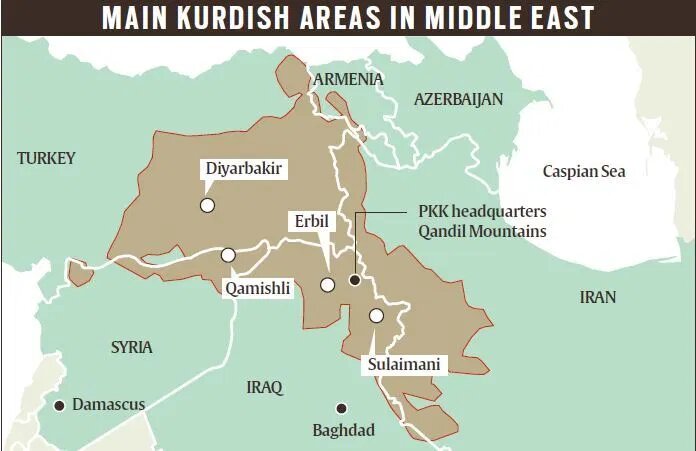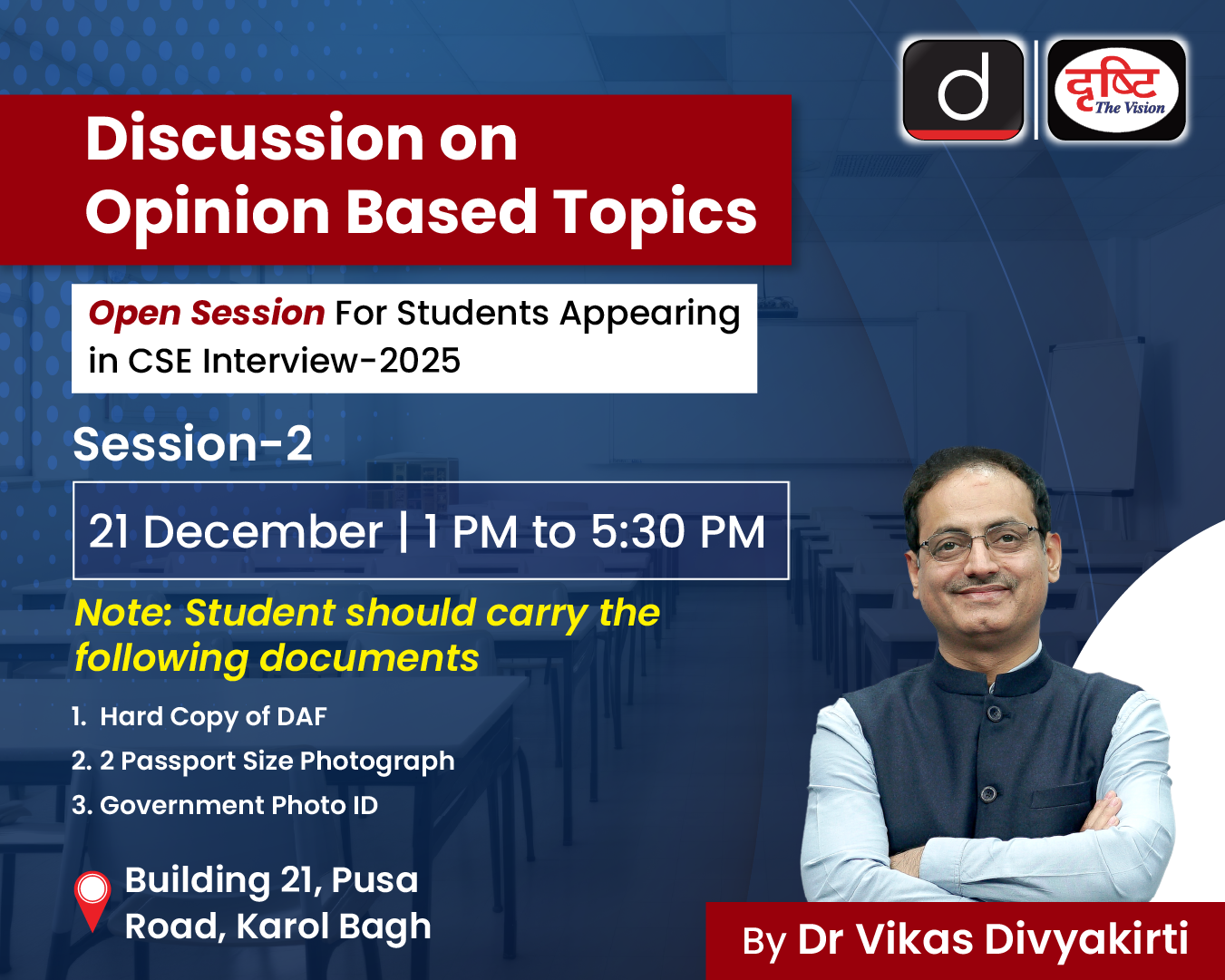International Relations
The Big Picture: Syria Crisis - US Backs out
- 25 Oct 2019
- 8 min read
Recently, the US announced to withdraw from Syria (in order to fulfil the US president’s electoral promise). However, this will lead to abandoning of Kurdish fighters in Syria, who were an American ally in the war against ISIS. This may lead to a decline in America's credibility amongst its allies.
With the US planning to leave Syria, Turkey has threatened to attack a part in Syria (northern Syria touching borders of Turkey) which was under the de-facto control of Kurds. The US has threatened to punish Turkey economically if it goes 'too far' against Kurds. However, what is 'too far' has not been clarified by the US.
Thus, US withdrawal from Syria may have deep implications for the region.
Who are Kurds?
- The Kurds are the world’s largest stateless ethnic group. There are an estimated 25 million to 35 million of them.
- They live in the highlands of southern and eastern Turkey, northern Iraq, northeastern Syria, northwestern Iran, and parts of south Armenia, and are a minority in each of these countries.
- Kurdish nationalists claim a history going back 2,500 years, but they became identifiable as a distinct community only in the 7th century, when most tribes in the area adopted Islam.
- The Treaty of Sèvres (1920), which partitioned the old Ottoman dominions, marked out a much smaller territory as Kurdistan. However, Turkey negotiated with the Allied powers and, in 1923, the Treaty of Lausanne, that overtook Treaty of Sèvres and ended the idea of a self-governing Kurdistan.
- Over the decades, the Kurds made repeated attempts at establishing a Kurdistan with defined national borders (within the territory of Turkey), and in this process, Turkey retaliated with massive repression of Kurds.
Turkey-Kurds-US Triangle
- In 1978, the Marxist revolutionary Abdullah Öcalan formed the Kurdistan Workers’ Party (Partiya Karkerên Kurdistanê or PKK in Kurdish) with the aim of setting up an independent Kurdistan.
- PKK guerrillas fought the Turkish army from 1984 to 2013, when the PKK declared a ceasefire.
- After the Islamic State (ISIS) swept across Syria and Iraq, the only fighters who were able to resist the onslaught were the Syrian Kurdish militias.
- In 2014, the Kurds joined the US in the war against ISIS, and become a helpful regional ally of the US.
- Once the Kurds, backed by the Americans, had forced ISIS out of northern Syria, they took over the re-captured land along the Syria-Turkey border, home mainly to ethnic Kurds, Arabs, and some other groups.
- Turkey sees it as a serious threat to its territorial integrity, Therefore Turkey plans to launch an assault on Kurdish-held territory in Syria.
Why Turkey is invading Syria now?
- By invading northern Syria, Turkey seeks to create a peace zone, where it can deport Syrian refugees that fled the country during the Civil war in Syria.
- However, experts believe in the name of the creation of a peace zone, Turkey wants to land grab the strategic area.
- Geopolitical Importance of northern Syria.
- It holds 30% of Syrian oil & gas.
- This area harbours a fertile agricultural land.
- Also, the region is drained by water from river Euphrates.
- Apart from this, the area is under control of Kurds, which Turkey recognizes as a threat to its territorial integrity.
- Geopolitical Importance of northern Syria.
Implications of the US's withdrawal from Syria
- Rise of Russia
- Syrian crisis was used by Russia to re-establish its credibility and legitimacy as a superpower in the region.
- This withdrawal of the US and Turkey's attack on Syria will lead to further deterioration of relations between the US and Turkey and revision of ties between Turkey and Russia.
- With the US out of the picture, countries in the Middle East are looking towards Russia for bringing peace and stability in the region.
- Also, Russia, Iran and Syria axis will strengthen from the Persian Gulf to the Mediterranean sea.
- Change in US's Policy in the region
- The US pursued the policy of regime change in Syria (through Arab Spring or post Arab spring Civil War).
- However, the US is changing its policy within the region-
- The US only seeks partial troops withdrawal (not full withdrawal, similar to Afghanistan), as it wanted to establish military bases in the countries.
- Thus, it is in the interest of the US to fragment Syria into small parts, that's why the US has abandoned Kurds.
- Resurgence of ISIS
- Many of the ISIS terrorists were captured by Kurds after they defeated ISIS.
- However, Turkey's attack on Kurds may lead to freeing up of ISIS prisoners, that are held captive by the Kurds.
- Turkish annexation will be met with Kurdish Resistance which will further destabilize the region.
In the middle of all this chaos, India can act as a credible mediator, as India is a unique country having stable relations with all the countries engaged in middle east conflict.
Drishti input:
Arab Spring and the Syrian Crisis
- Arab Spring
- The Arab Spring was a series of pro-democracy uprisings that enveloped several largely Muslim countries, including Tunisia, Morocco, Syria, Libya, Egypt and Bahrain.
- The Arab Spring began in December 2010 when Tunisian street vendor Mohammed Bouazizi set himself on fire to protest the arbitrary seizing of his vegetable stands by police over failure to obtain a permit.
- Syrian Crisis
- In 2011, successful uprisings in Tunisia and Egypt gave hope to Syrian pro-democracy activists.
- The Syrian government, led by President Bashar al-Assad, responded to the protests by killing hundreds of demonstrators and imprisoning many more.
- In July 2011, defectors from the military announced the formation of the Free Syrian Army(FSA), a rebel group aiming to overthrow the government, and Syria began to slide into civil war.
- Foreign backing and open intervention have played a large role in Syria's civil war. Russia entered the conflict in 2015 and has been the Syrian government's main ally since then.
- In September 2015, Russia launched a bombing campaign against what is referred to as "terrorist groups" in Syria, which included ISIS as well as FSA backed by the USA.
- Due to this Syrian civil war has turned into a regional proxy war.
- Syria + Iran + Russia vs Saudi Arabia + Israel + US.








